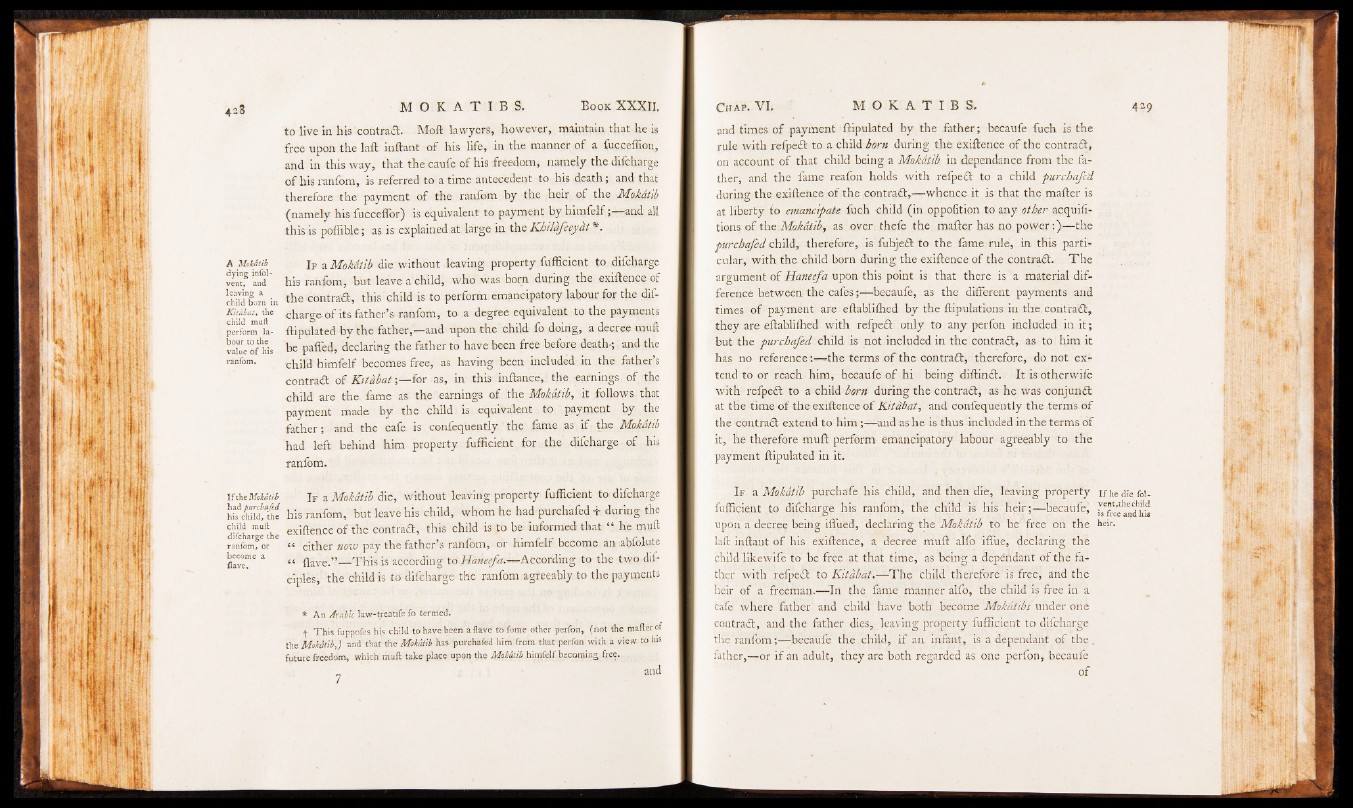
A Mokdtib
dying infol-
vent, and
leaving a
child born in
Kitabat, the
child mud
perform labour
to the
value o f his
ranfom.
I f the Mokatib
had purcbafed
his child, the
child mud
difcharge the
ranfom, or
become a
Have.
to live in his contra#. Moft lawyers, however, maintain that he is
free upon the laft inftant of his life, in the manner of a fucceffion,
and in this way, that the caufe of his freedom, namely the difcharge
o f his ranfom, is referred to a time antecedent to his death; and that
therefore the payment of the ranfom by the heir of the Mokatib
(namely his fucceflor) is equivalent to payment by himfelf; and all
this is poffible; as is explained at large in the Khilafeeyat *.
If a Mokatib die without leaving property fufficient to difcharge
his ranfom, but leave a child, who was born during the exiftence of
the contract, this child is to perform emancipatory labour for the difcharge
of its father’s ranfom, to a degree equivalent to the payments
ftipulated by the father,—and upon the child fo doing, a decree -muft
be paffed, declaring the father to have been free before death*; apd the
child himfelf becomes free, as having been included in the father’s
contrail of K i t a b a t for as, in this inftanee, the earnings of the
child are the fame as the earnings of the Mokdtib, it follows that
payment made by the child is-, equivalent to payment by the
father; and the cafe is confequently the lame .as if-the Mokdtib
had left behind him property fufficient for the' difcharge of his
ranfom.
If a Mokatib die, without leaving property fufficient to difcharge
his ranfom, but leave his child, whom he had purchafed t during the
exiftence of the contra£l, this child is to be informed that “ he muft
“ either ntrvu pay the father’s random, or himfelf become, an abfolute
“ {lave.”—This is according to Haneefa.— According to the two dif-
ciples, the child is to difcharge the ranfom agreeably to the payments
* A n Arabic law-treatifefo termed.
t T h is fuppofes his child to have been a (lave to Come other perfon, (not the mailer of
the Mokatib,) and that the Mokatib has purchafed him from that perfon with a view to his
future freedom, which muft take place upon the Mokatib himfelf becoming free.
1 ■ - and
7
and times of payment ftipulated by the father; becaufe fuch is the
rule with refpect to a child born during the exiftence of the contract,
on account of that child being a Mokdtib in dependance from the father,
and the fame reafon holds with refpedl to a child purchafed
during the exiftence of the contract,— whence it is that the mafter is
at liberty to emancipate fuch child (in oppofition to any other acquifi-
tions of the Mokdtib, as over thefe the mafter has no power:■ )— the
purchafed child, therefore, is fuhjedt to the fame rule, in this parti?
cular,, with the child born during the exiftence of the contrail. T h e
argument of Hanéefa upon this point is that there is a material difference
between the cafes;— becaufe, as the different payments and
times of payment are eftablifhed by the ftipulations in the. contrail,
they are eftablifhed with refpeil only to any perfon included in i t ;
but the purchafed child is not included in the contrail, as to him it
has no reference:—-the terms of the contrail, therefore, do not extend
to or reach him, becaufe of hi being diftinil. It is otherwife
with refpeil to a child born during the contrail, as he was conjunit
at the time of the exiftence o f Kitabat, and confequently the terms of
the contrail extend to him;— and as he is thus included in the terms of
it, he therefore muft perform emancipatory labour agreeably to the
payment ftipulated in it.
I f a Mokatib pu.rchafe his child, and then die, leaving property i f h e d ie fo l-
fufficient to difcharge his ranfom, the child is' hi&'heir;— becaufe}
upon a decree being iffued, declaring the Mokdtib to he''free on the heir,
laft inftant of his exiftence, a decree muft alfo iflue,. declaring - the
child likewife to be free at that time, as being a dependant o f the father
with refpeil to Kitabat.— T h e child therefore‘is free, and the
heir of a freeman.—-In the fame manner alfo, the child is free in a
bale where father and child havé both become Mokdtibs under one
contract, and the father dies, leaving property fufficient to difcharge
the ranfom;— becaufe the child, if an infant, is a dependant of the.
father,— or if an adult, they are both regarded as one perfon■, becaufe
of